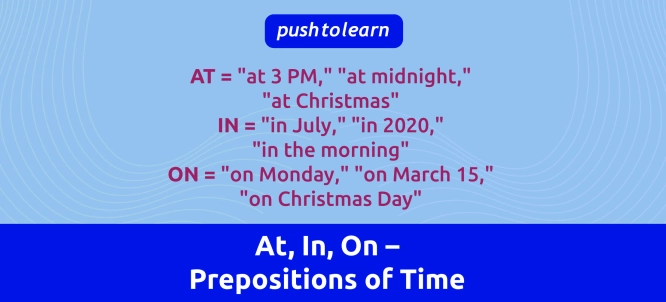by PushtoLearn
At, In, On – Prepositions of Time
Table of Contents
At, In, On – Prepositions of Time - Exercises
These exercises focus on prepositions of time AT, IN and ON
When to Use "At," "In," and "On"
|
Preposition |
Usage |
Examples |
|
At |
Specific times, holidays |
"at 3 PM," "at midnight," "at Christmas" |
|
In |
Longer periods: months, years, seasons, and parts of the day |
"in July," "in 2020," "in the morning" |
|
On |
Specific days and dates |
"on Monday," "on March 15," "on Christmas Day" |

How to Use "At"
"At" is used for specific times, festivals, and certain expressions.
-
Specific Times
Use "at" for clock times or specific points in the day. -
Examples:
-
"The meeting starts at 10:00 AM."
-
"She goes to bed at midnight."
-
Holidays and Festivals
Use "at" for general holidays or festivals without mentioning "day." -
Examples:
-
"We visit family at Christmas."
-
"The shops close at New Year."
-
Expressions of Time
Common expressions that use "at" include "at the moment," "at night," and "at the weekend" (British English). -
Examples:
-
"He’s busy at the moment."
-
"We usually go out at night."
How to Use "In"
"In" is used for longer periods, such as months, years, seasons, and parts of the day.
-
Months, Years, and Seasons
Use "in" for months, years, and seasons to show a longer, undefined period. -
Examples:
-
"Her birthday is in May."
-
"They met in 2015."
-
"We travel a lot in summer."
-
Parts of the Day
Use "in" for parts of the day, except for "night." -
Examples:
-
"He works in the morning."
-
"I like to relax in the evening."
How to Use "On"
"On" is used for specific days and dates.
-
Days of the Week
Use "on" for days of the week and specific days. -
Examples:
-
"I have a class on Monday."
-
"They play football on Saturdays."
-
Dates
Use "on" for exact dates. -
Examples:
-
"Her exam is on March 15th."
-
"We’re meeting on October 10th."
-
Holidays with "Day"
If the word "day" is included in the holiday, use "on." -
Examples:
-
"I’ll see you on Christmas Day."
-
"The event is on New Year’s Day."
Common Mistakes with "At," "In," and "On"
-
Using "in" instead of "on" for dates
Remember to use "on" for exact dates, not "in." -
Incorrect: "Her birthday is in April 10th."
-
Correct: "Her birthday is on April 10th."
-
Using "at" instead of "in" for months, years, and seasons
Use "in" for months, years, and seasons. -
Incorrect: "He was born at 1999."
-
Correct: "He was born in 1999."
-
Using "in" instead of "at" for specific times
Use "at" when referring to clock times. -
Incorrect: "Let’s meet in 5 PM."
-
Correct: "Let’s meet at 5 PM."
Examples in Sentences
-
At:
-
"She wakes up at 6:30 AM every day."
-
"We celebrate at New Year with fireworks."
-
In:
-
"My vacation is in July."
-
"He usually exercises in the afternoon."
-
On:
-
"We have a meeting on Friday."
-
"Her appointment is on August 20th."
It may also be useful to learn This, That, These, Those and Prepositions of Place to be able to describe something specific in our surroundings and palce of events.
Summary Table
|
Preposition |
Used For |
Examples |
|
At |
Specific times, holidays |
"at 8 PM," "at noon," "at Christmas" |
|
In |
Months, years, seasons, parts of the day |
"in March," "in 2021," "in the evening" |
|
On |
Specific days and dates |
"on Tuesday," "on July 4th," "on Christmas Day" |
FAQ
When should I use "at" for time?
Use "at" for specific times (e.g., "at 7 PM") and holidays without "day" (e.g., "at Christmas").
Can I use "in" for specific dates?
No, use "on" for specific dates, like "on April 1st."
Is it "in the night" or "at night"?
Use "at night" for nighttime. Use "in the evening" for the time before night.
Why is it "in the morning" but "at noon"?
"In" is used for longer parts of the day (like "morning"), while "at" is used for specific points (like "noon" and "midnight").
Do I use "on" or "at" for weekdays?
Use "on" for days of the week (e.g., "on Monday").

